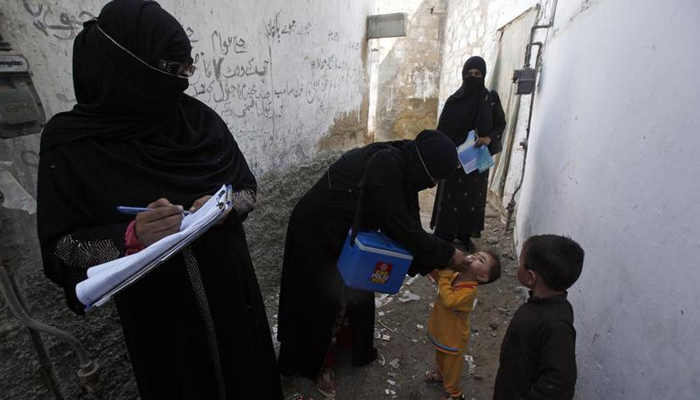Despite spending $5b, Pakistan's polio-free dream remains elusive
After two back-to-back polio cases in April, a polio-free Pakistan seems far from reach
May 03, 2022

KARACHI: Despite spending $5 billion during the last 27 years, the dream of a polio-free Pakistan remained elusive with the emergence of two back-to-back polio cases in April.
The factors responsible for denting the efforts to achieve the milestone ranged from deep mistrust in some sections of the society regarding the anti-polio campaign to poor law and order situation.
Experts have described a deep mistrust among Pashtun communities living on the border region of Pakistan and Afghanistan against Oral Polio Vaccination (OPV) drives a recent wave of insurgency and attacks on security forces in former tribal areas, and failure to track missed children during the polio vaccination campaigns as the key reasons behind relapsing of polio cases in the country.
They apprehended that more polio cases could emerge from the tribal belt of Khyber Pakhtunkhawa, Pashtun areas of Balochistan, and super high-risk union councils in Karachi in the coming high-transmission season of summer.
They also claimed that hundreds of children could not be vaccinated against the crippling disease due to poor quality vaccination drives in the last few months.
Polio eradication authorities in Pakistan reported the second polio case from North Waziristan on Friday when a two-year-old baby girl was found infected with polio, while a 15-month-old boy was found crippled with the dreaded poliovirus in the same area on April 22.
Ironically, both the children had not received a single drop of Oral Polio Vaccine (OPV) despite dozens of vaccination drives in the country.
Around $5 billion have so far been spent for polio eradication in Pakistan since 1994 as the programme started with the administration of polio dose to Aseefa Bhutto Zardari, the daughter of then-prime minister Benazir Bhutto.
Since then, hundreds of litres of oral polio vaccines have been given to millions of children.
'Deep mistrust'
Talking to The News, a former official who remained associated with the polio eradication initiative in Pakistan blamed "a deep mistrust in the Pashtun" communities, especially tribal area people in polio eradication efforts, saying despite spending millions of dollars on advocacy, adamant parents were not persuaded to let their children receive OPV drops.
“Hundreds of them still consider the campaigns as a conspiracy, secretly ask newly married couples to prevent their children from having OPV drops,” claimed the official, who is himself a Pashtun belonging to the former Khyber Agency.
He added that almost 90% of the children crippled by poliovirus were Pashtuns, the majority of them had not received even a single drop of OPV during routine and special vaccination drives.
The official also called for a complete overhaul of the polio eradication program in the country by bringing "competent leadership" in the polio eradication initiative.
“Political appointments, favouritism, and mismanagement in the polio eradication need to be addressed finally to eradicate polio from our soil,” the official said
The official added that health issues, including acute malnutrition as well as the provision of primary healthcare facilities, also needed attention in underdeveloped areas to eradicate polio from Pakistan.
What do the people say?
Several Pashtuns interviewed by this scribe in Sohrab Goth, Ittihad Town, and Manghopir areas of Karachi and others living in Dera Ismail Khan and Bannu area in KP said they had no trust in polio eradication drives, adding that there was a hidden conspiracy behind these campaigns.
“No health facility is available to us in all the former tribal agencies despite their merger with KP province but every month, these vaccinators knock at our doors under the protection of police and security forces and force us to give oral polio drops to our children,” said Rafatullah Mehsud, a resident of Sohrab Goth.
“When we ask them to provide us other health facilities, they say funds for polio are being provided by international agencies and they are under pressure to do these campaigns," he continued.
Rafatullah, who has three children, including a son and two daughters, claimed that despite not consuming even a single drop of the oral polio vaccine, his children, who were seven, five, and three years of age, were fit and healthy.
Several other Pashtuns interviewed by this scribe said they hide their children or shift them to other areas during vaccination campaigns as they did not trust these campaigns, adding, that polio workers also cooperate with them and mark their children as vaccinated upon request.
Virus in circulating in 6 KP districts
Commenting on the emergence of two back-to-back polio cases in April 2022, National Coordinator of Emergency Operation Center (EOC) Islamabad Dr Shahzad Baig confirmed that Wild Polio Virus 1(WPV1) was circulating in the six districts of KP, including North and South Waziristan, Dera Ismail Khan, Bannu, Lucky Marwat and Tank.
Unvaccinated children became victims of the virus, he warned.
“Whenever an unvaccinated child with weak immunity contracts the viral poliovirus, it cripples the child. Unfortunately, both the children, who were found infected with poliovirus, had not received even a single drop of OPV,” said Dr Baig.
“If more polio cases are reported from anywhere in the country, they will be likely from these six districts of KP," he added.
Originally published in The News











